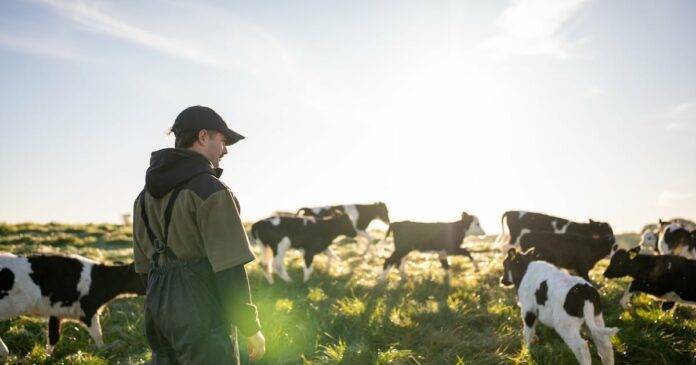A recent study conducted by a team from Curtin University Sustainability Policy Institute in Perth shed light on the challenges faced by Australian farmers in the dairy industry. The research surveyed 147 farmers to understand their attitudes towards dairy farming and whether they would consider transitioning to other forms of agriculture.
The study revealed that more than half of the farmers surveyed were not satisfied with dairy farming, citing rising operational costs, labor shortages, and work-life balance as primary concerns. Financial constraints due to high input costs and unstable milk prices were impacting operational efficiencies, hindering investments in infrastructure, labor, and animal health. Adverse weather events such as floods and droughts also posed challenges to milk production and profitability.
While climate change was acknowledged as a contributing factor to farmers’ hardships, only a third of respondents recognized it as a major challenge to their business models. Professor Clive Phillips, a co-author of the study, highlighted the importance of addressing climate change in the agricultural sector to ensure long-term sustainability.
Mental health was another significant issue for farmers, with two-thirds reporting negative impacts on their well-being due to farm-related challenges. Long working hours, economic hardship, and sector consolidation were identified as factors contributing to poor mental health among farmers. The study also revealed alarming statistics on suicide rates among farmers, emphasizing the need for greater support and resources for mental health in the agricultural community.
Despite the challenges faced by dairy farmers, more than half of the respondents expressed openness to exploring alternatives to dairy farming. However, factors such as profitability, land suitability for other agricultural operations, and familiarity with dairy farming were cited as reasons for hesitation. Government funding and grants were unlikely to persuade farmers to transition away from dairy, with most indicating a preference to stay in the industry despite financial incentives.
The study found that financial support could influence farmers considering leaving the industry to stay, with a majority expressing a desire for support to remain in the sector. Aging, health issues, and labor shortages were key considerations for farmers contemplating transitioning to other forms of agriculture. Family ties, land ownership, and a passion for dairy farming were highlighted as factors reinforcing commitment to the industry.
While transitioning to alternative agricultural ventures presents challenges, diversification into mixed farming was seen as a viable option for maintaining a stable income. Some farmers viewed diversification as a way to mitigate financial burdens and adapt to market fluctuations. By incorporating beef, horticulture, or broadacre farming alongside dairy, farmers could create a more resilient and sustainable business model.
In conclusion, the study highlighted the need for greater support for dairy farmers to address challenges such as rising costs, mental health issues, and climate change. By promoting diversification, providing resources for mental health, and offering financial incentives to support farmers, policymakers can help ensure the sustainability and resilience of the dairy industry in Australia. Climate change is a pressing issue that affects various industries, including agriculture. In the dairy farming sector, there is a growing need to address on-farm emissions and reduce environmental impact. While efforts to improve soil health and reduce reliance on fertilizers can help mitigate costs and emissions, it is crucial for dairy farmers to also consider the impact of their livestock on greenhouse gas emissions.
According to research, agriculture accounts for approximately 16% of Australia’s total greenhouse gas emissions, with direct on-farm emissions from dairy farms contributing about 19% of this total. This amounts to about 3% of the nation’s overall emissions, highlighting the significant role that dairy farming plays in environmental impact.
Despite the need to address climate change concerns, it is evident from the study that many dairy farmers do not see it as a top priority in their day-to-day operations. The research found that while farmers expressed concerns about climate change uncertainty and its potential impact on their businesses, there was a lack of acknowledgment regarding the high levels of greenhouse gas emissions produced by cattle.
The authors of the study noted a disconnect between dairy farmers’ awareness of their livestock’s contribution to climate change and the potential benefits of transitioning to more plant-based choices. This lack of recognition could influence farmers’ interest in exploring alternative enterprises that are more sustainable and environmentally friendly.
To address these challenges, dairy farmers can take proactive steps to reduce their environmental impact and transition to more sustainable practices. Improving soil health through crop rotation, introducing new cover crops, and monitoring soil nutrients are effective strategies to reduce reliance on fertilizers and enhance overall farm sustainability.
Additionally, dairy farmers can explore opportunities to reduce on-farm emissions by implementing practices such as methane capture systems, improving waste management, and optimizing herd management practices. These measures can help reduce greenhouse gas emissions and contribute to a more sustainable dairy farming industry.
It is essential for dairy farmers to prioritize environmental sustainability and consider the impact of their operations on climate change. By taking proactive steps to reduce emissions, improve soil health, and explore alternative business opportunities, dairy farmers can play a significant role in mitigating environmental impact and transitioning to more sustainable practices.
In conclusion, addressing climate change concerns in the dairy farming sector requires a multi-faceted approach that includes improving soil health, reducing on-farm emissions, and exploring alternative business opportunities. By prioritizing environmental sustainability and taking proactive steps to reduce environmental impact, dairy farmers can contribute to a more sustainable and resilient industry in the face of climate change challenges.




